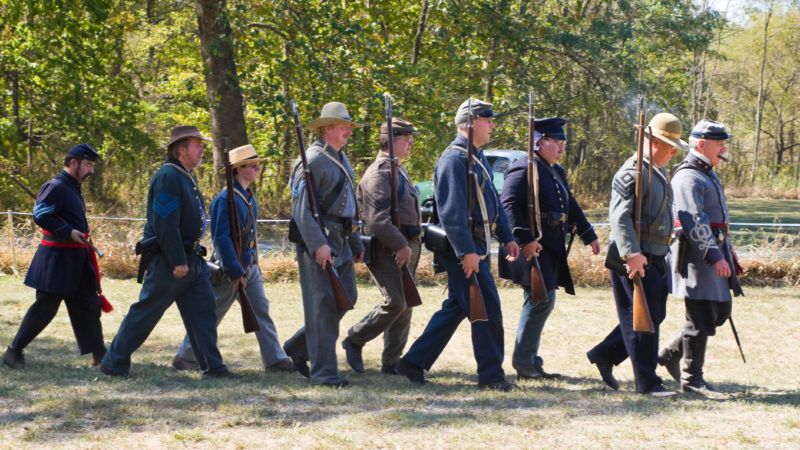Both Left and Right Should Stop Blithely Wishing for a New Civil War
All that accomplishes is encouraging us to view our fellow Americans as enemies, to see ourselves as members of warring tribes rather than citizens of a nation.

"We are in a civil war," former U.S. attorney Joseph diGenova, a prominent conservative, said on a popular podcast last year. "So the suggestion that there's ever going to be civil discourse in this country for the foreseeable future is over….It's going to be total war."
The quotation, from a Washington Post article that calmly discussed renewed chatter about a previously taboo subject, sent chills up my spine even though the words clearly were hyperbolic. One could even view diGenova as prescient. He made those comments after the Mueller report was released and partisans were at each other's throats over impeachment.
Fifteen months later, the nation is emerging from two months of government-imposed COVID-19-related lockdowns—something that had sparked unrest as "reopen" protesters took to the streets to defy the (presumably) temporary suspension of our liberties.
The coronavirus disruptions now are yesterday's headlines as American cities literally are ablaze—sparked by outrage over a video showing the disturbing police-custody death of George Floyd. Even people like me, who have long complained about overly aggressive police tactics, have been horrified by the violence, looting and mayhem. The talk of civil war, serious or not, is more heated than ever.
Conservatives are blaming Antifa—those bands of fascistic-seeming "anti-fascists"—and liberals are blaming resurgent white supremacists. The president is inflaming passions rather than calming nerves with his tweets about shooting looters, which echo the comments from another perilous time in the nation's history.
I've even read Facebook comments, where ordinary people seemed resigned to a coming civil war—or at least to an endless cycle of anger and disruption. If ordinary people think this way, then surely there's no hope for the nation's future. Actually, I believe that conclusion to be wrong.
It's time to take a deep breath and consider our current divisions within some historical context. The nation has faced divided, troubling times throughout its history. Our founding revolution pitted Americans against their neighbors, with as many as a third of the American population backing the British crown. And the Civil War was no walk in the park.
"The Civil War's rate of death, its incidence in comparison with the size of the American population, was six times that of World War II," according to the National Park Service website. "A similar rate, about 2 percent, in the United States today would mean 6 million fatalities." That just looks at deaths—not at the incomprehensible number of injuries, widespread suffering and destruction.
We should never make light of what a Civil War would mean. Nor should we think that our current discord comes close to the level of division that had existed in our past. After the Civil War, the nation struggled through Reconstruction, decades of civil-rights battles because of the systemic denial of equal rights to a large portion of the citizenry and, of course, the 1960s-era protests over the Vietnam War.
These current events are the most disruptive times in many of our lifetimes, but they are nothing new—nor are they particularly awful. We are not headed toward a new civil war, so everyone—on the Left and Right—should stop using over-the-top rhetoric. It only encourages us to view our fellow Americans as enemies, to see ourselves as members of warring tribes rather than citizens of a nation, and desensitizes us to violence. The nation has real divisions, and singing Kumbaya won't heal them, but our society still functions remarkably well.
Civil wars take place when neither side sees any hope under the current arrangements. I see lots of hope. If you spend hours on social media, you might conclude otherwise. But try taking a break from reading the odd thoughts of your Aunt Agnes or arguing about politics with a "friend" you may never have even met in person. Do you see people at each other's throats when you head to the bank, store or office? Of course not.
We may not be united, but this remains a wealthy and generally peaceful nation. Even the latest conflicts can be resolved with reasonable solutions that are entirely attainable within our system. Before the riots, Americans seemed to agree on the need for police reforms. We don't need a revolution to, say, reform the union protections that keep bad officers on the force. Whatever one thinks of Trump, his administration will one day pass.
Instead of bloviating about civil wars, we need to talk about restoring civil society. Everyone has been quoting Martin Luther King Jr. these days, so I'll finish with one of my MLK favorites: "There is some good in the worst of us and some evil in the best of us. When we discover this, we are less prone to hate our enemies." Better yet, let's stop thinking of our political opponents as enemies instead of as misguided fellow citizens.
This column was first published in the Orange County Register.
